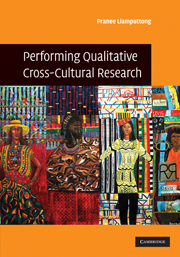Book contents
- Frontmatter
- Contents
- Preface
- About the author
- About the book
- 1 Performing qualitative cross-cultural research: an introduction
- 2 Moral and ethical perspectives
- 3 The research participants: accessing and reciprocity
- 4 Cultural sensitivity: a responsible researcher
- 5 Insider/Outsider perspectives and placing issues
- 6 Cross-cultural communication and language issues
- 7 Personal and collective testimony
- 8 Local knowledge, local power and collective action
- 9 Writing and disseminating in cross-cultural research
- In closing …
- References
- Index
- References
2 - Moral and ethical perspectives
Published online by Cambridge University Press: 05 June 2012
- Frontmatter
- Contents
- Preface
- About the author
- About the book
- 1 Performing qualitative cross-cultural research: an introduction
- 2 Moral and ethical perspectives
- 3 The research participants: accessing and reciprocity
- 4 Cultural sensitivity: a responsible researcher
- 5 Insider/Outsider perspectives and placing issues
- 6 Cross-cultural communication and language issues
- 7 Personal and collective testimony
- 8 Local knowledge, local power and collective action
- 9 Writing and disseminating in cross-cultural research
- In closing …
- References
- Index
- References
Summary
Many shameful events in the history of clinical research testify to the ease with which researcher-participants have exploited the vulnerability of oppressed or devalued members of society for the ultimate benefit of others.
(Baylis et al. 1998: 244)The principle that underlies problems of ethics is respecting the humanity of others as one would have others respect one's own. If field [researchers] genuinely feel such respect for others, they are not likely to get into serous trouble. But if they do not feel such respect, then no matter how scrupulously they follow the letter of the written codes of professional ethics, or follow the recommended procedures of field [research] manuals, they will betray themselves all along the line in the little things.
(Goodenough 1980: 52)Ethics is a set of moral principles that aim to prevent research participants from being harmed by the researcher and the research process. Ethical and moral responsibility is essential in any research, but when it comes to cross-cultural research it is even more important, as the researchers deal with individuals who have been exploited, who are more marginalised and vulnerable in so many ways. Often, they are people living in poverty, who do not have enough education to deal with the formality of research, and who feel too powerless to express their concerns or to resist the power of researchers.
- Type
- Chapter
- Information
- Performing Qualitative Cross-Cultural Research , pp. 31 - 57Publisher: Cambridge University PressPrint publication year: 2010



